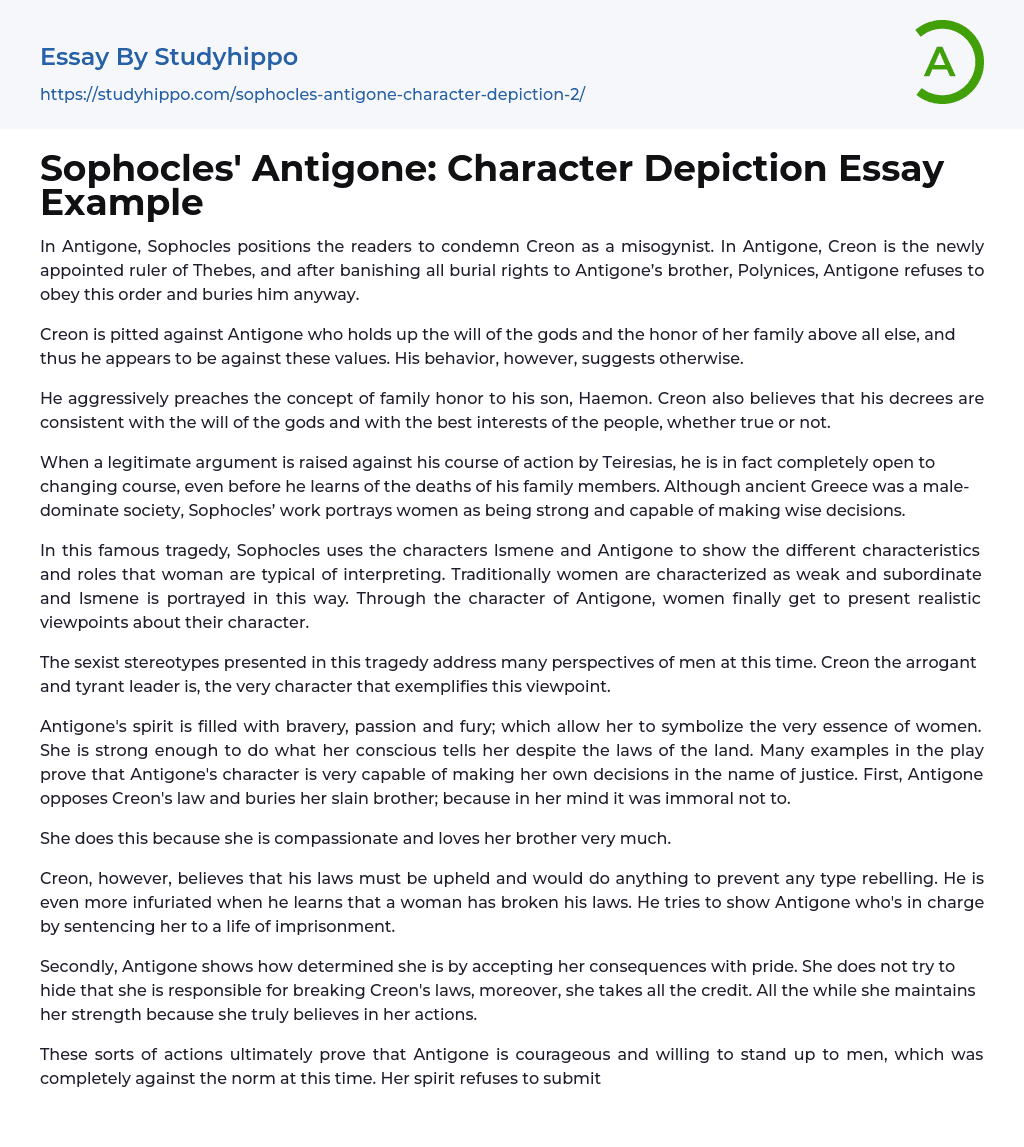Sophocles’ Antigone displays Creon as a misogynist due to his position in the play as a newly appointed ruler of Thebes who eliminates all burial rights to Antigone’s brother, Polynices. Antigone defies this order believing that the will of the gods and her family’s honor is more important. Creon, however, advocates family honor aggressively to his son Haemon and thinks his decrees align with the gods' will and people's best interest, regardless of their veracity. Even though ancient Greece was male-dominated, women in Sophocles’ work are portrayed as strong and capable of making wise decisions. The characters Ismene and Antigone illustrate varied characteristics of women traditionally interpreted as weak and subordinate or realistic viewpoints about their character, respectively.The tragedy portrays various perspectives of men during this time, presenting sexist stereotypes. Creon, a proud and t
...yrannical leader, embodies this view. Meanwhile, Antigone's character exemplifies the essence of women, as she is brave, passionate, and fierce. Despite the laws of the land, her conscience drives her to take action for justice. Antigone defies Creon's law by burying her slain brother, whom she loves dearly and believes deserves a proper burial. In contrast, Creon believes in upholding his laws and punishes Antigone severely for breaking them. Antigone accepts her sentence with pride, taking full responsibility for her actions. Her unwavering strength proves that she is courageous and willing to stand up against men, despite societal norms.Despite her sister Ismene's cowardly behavior driven by fear of men, Antigone's spirit remains strong and independent, refusing to submit to the helpless female role imposed upon her. Ismene embodies the traditional male viewpoint regarding women, portrayed as subordinate and weak-willed.
Even though she knows Creon's laws are morally wrong, Ismene is afraid to stand up to him, reflecting the common depiction of women in famous artworks. In contrast, Antigone is willing to do the right thing and stand up to Creon despite the risks. Ismene even tries to take credit for burying her brother with Antigone out of fear of being left alone. Creon's lack of respect for women is demonstrated again when he accuses Ismene of aiding Antigone. He later dismisses her importance by saying she never had a mind at all. Throughout the play, there are several instances depicting a sexist male viewpoint, as Creon believes his laws are just and fair, given his divine rule over Theben's throne.Throughout the play, Creon rules his kingdom with an iron fist, displaying his prejudices towards women. He demonstrates this by punishing Antigone as harshly as possible for breaking his laws, indicating that he views women as inferior to men in terms of authority. He believes that women lack common sense and should be punished for their irrationality. Eventually, he realizes his mistakes when his own wife takes her own life due to his tyranny against humanity. However, it is too late for him to redeem himself or take back his contempt towards women. The Greek tragedy Antigone by Sophocles highlights the different roles women play in society, with Antigone embodying a strong and sensible woman while her sister Ismene represents the meek and mild role. Creon's tyrannical rule exemplifies the sexist male viewpoint of ancient Greek society, showing that gender differences have always been present.
- First person essays
- Values of Life essays
- Ethical dilemma essays
- Normative Ethics essays
- Virtue Ethics essays
- Belief essays
- Deontology essays
- Moral essays
- Virtue essays
- Work Ethic essays
- 1984 essays
- A Farewell to Arms essays
- A Good Man Is Hard to Find essays
- A Hanging essays
- A Lesson Before Dying essays
- A Long Way Gone essays
- A Rose For Emily essays
- A Separate Peace essays
- A Tale Of Two Cities essays
- A Very Old Man With Enormous Wings essays
- Adventures Of Huckleberry Finn essays
- Alice in Wonderland essays
- All Quiet on The Western Front essays
- Allegory of the Cave essays
- An occurrence at owl creek bridge essays
- Animal Farm essays
- Anthem essays
- Antigone essays
- Arthur Conan Doyle essays
- As I Lay Dying essays
- Atticus Finch essays
- Barn Burning essays
- Battle Royal essays
- Beauty and The Beast essays
- Beloved essays
- Boo Radley essays
- Brave New World essays
- Candide essays
- Castle essays
- Characters In Hamlet essays
- Characters In Romeo And Juliet essays
- Christmas carol essays
- Chronicle of a Death Foretold essays
- Cinderella essays
- Crime and Punishment essays
- Daisy Miller essays
- Death of a Salesman American Dream essays
- Desdemona essays
- Diary Of A Wimpy Kid essays
- Dracula essays




